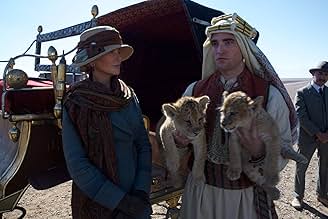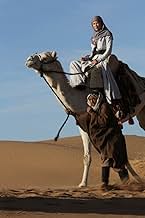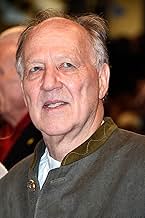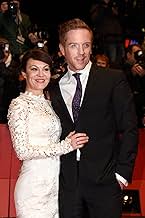VALUTAZIONE IMDb
5,7/10
13.031
LA TUA VALUTAZIONE
Una cronaca della vita di Gertrude Bell, viaggiatrice, scrittrice, archeologa, esploratrice, cartografa e rappresentante politico per l'impero britannico agli albori del XX secolo.Una cronaca della vita di Gertrude Bell, viaggiatrice, scrittrice, archeologa, esploratrice, cartografa e rappresentante politico per l'impero britannico agli albori del XX secolo.Una cronaca della vita di Gertrude Bell, viaggiatrice, scrittrice, archeologa, esploratrice, cartografa e rappresentante politico per l'impero britannico agli albori del XX secolo.
- Regia
- Sceneggiatura
- Star
- Premi
- 1 candidatura in totale
Recensioni in evidenza
The film is ok, I never felt bored or found myself waiting for it to finish.
However the depiction of Gertie was really of an entitled woman who swanned around wherever she felt like because she believed she should be able to, whilst letting other people fix things for her.
There must have been more to this person than this?
However the depiction of Gertie was really of an entitled woman who swanned around wherever she felt like because she believed she should be able to, whilst letting other people fix things for her.
There must have been more to this person than this?
I have to be blunt. Reading Gertrude Bell's Wikipedia entry arguably provides more thrills than watching Werner Herzog's misfire of a biopic. Although a contemporary and, as this film suggests, a likely friend of TE Lawrence, Queen of the Desert, doesn't even come remotely close to telling Bell's story with the same sort of grandeur and vision that David Lean achieved with Lawrence of Arabia.
Bell led a life of adventure and achievement, in a range of diverse locations and across a variety of disciplines that Herzog doesn't really even attempt to explore. Hell, the woman even had an interesting death (as far as deaths can be interesting I suppose). He only focuses his cameras on Bell's middle eastern travels. But then makes the mistake of trying to define much of Bell's life through a couple of failed and unfulfilled love encounters with men associated with diplomatic posts. A great deal of onscreen time is spent in various embassies and at different functions, that I'm afraid I consider time just wasted.
When Herzog finally decides to turn to the desert, we are presented with some breath-taking, but often quite brief scenes. We see her begin to interrelate with a number of Bedouin tribes in abrupt, fairly forgettable exchanges, which never succeed in portraying how she ended up being such an influentially historical figure in the region, whose reputation rivalled that of Lawrence himself. Then there are factual inaccuracies that Herzog allows/makes for no real artistic objectives. Basic things such as her being confined to Ha'il for 11 days, not over 3 weeks as mentioned in the dialogue. Occasional years and dates are mentioned onscreen, but shouldn't be taken too seriously. Using the film's timeline, the film appears to begin in 1902, when an obviously young Gertrude first achieves her ambition of travelling east due to her influential father. The only trouble with that is, by this time she was actually 34 and had made copious trips to the Middle East.
Queen of the Desert was both a critical failure and a rather huge commercial flop. It's such a shame that $36 million should be wasted on a movie that doesn't really begin to explore what made this independent, intelligent woman ahead of her times tick.
Bell led a life of adventure and achievement, in a range of diverse locations and across a variety of disciplines that Herzog doesn't really even attempt to explore. Hell, the woman even had an interesting death (as far as deaths can be interesting I suppose). He only focuses his cameras on Bell's middle eastern travels. But then makes the mistake of trying to define much of Bell's life through a couple of failed and unfulfilled love encounters with men associated with diplomatic posts. A great deal of onscreen time is spent in various embassies and at different functions, that I'm afraid I consider time just wasted.
When Herzog finally decides to turn to the desert, we are presented with some breath-taking, but often quite brief scenes. We see her begin to interrelate with a number of Bedouin tribes in abrupt, fairly forgettable exchanges, which never succeed in portraying how she ended up being such an influentially historical figure in the region, whose reputation rivalled that of Lawrence himself. Then there are factual inaccuracies that Herzog allows/makes for no real artistic objectives. Basic things such as her being confined to Ha'il for 11 days, not over 3 weeks as mentioned in the dialogue. Occasional years and dates are mentioned onscreen, but shouldn't be taken too seriously. Using the film's timeline, the film appears to begin in 1902, when an obviously young Gertrude first achieves her ambition of travelling east due to her influential father. The only trouble with that is, by this time she was actually 34 and had made copious trips to the Middle East.
Queen of the Desert was both a critical failure and a rather huge commercial flop. It's such a shame that $36 million should be wasted on a movie that doesn't really begin to explore what made this independent, intelligent woman ahead of her times tick.
This film tells the story of a British woman who travels around Arabia to understand the life in the vast desert. She is undeterred by dangers of war, gangs and thieves.
The last Warner Herzog film I watched was over ten years ago, and I did not enjoy the experience. "Queen of the Desert", fortunately, is way better than I expected it to be. The scenery of the desert is mesmerising, while the people it portrays are very interesting and very different from the Western civilisation. Cinematography is beautiful, and the film is hence a pleasant experience to watch. I also like the romance between Gertrude and the two gentlemen. It is rather unfortunate that her life is not rewarded with happiness on the romantic aspect. I enjoyed watching this film.
The last Warner Herzog film I watched was over ten years ago, and I did not enjoy the experience. "Queen of the Desert", fortunately, is way better than I expected it to be. The scenery of the desert is mesmerising, while the people it portrays are very interesting and very different from the Western civilisation. Cinematography is beautiful, and the film is hence a pleasant experience to watch. I also like the romance between Gertrude and the two gentlemen. It is rather unfortunate that her life is not rewarded with happiness on the romantic aspect. I enjoyed watching this film.
Queen of the Desert breaks form with several other Herzog movies: A female lead character, a grand Hollywood-like production and most interesting: a different perspective on the culture-nature dichotomy and the effects of cultural distance that almost forms the core of Herzog's work.
It tells the story of Gertrude Bell (Kidman), an English writer and traveler who became more and more influential in the Middle East region through her unprecedented travels where she formed bonds with several future postcolonial leaders. Later in life she became involved in politics and helped to found several nation states (and determine its borders), along which Jordan and Iraq through the Hashemite dynasties. She worked in close cooperation with T.E. Lawrence (Pattison).
It is always interesting to see what's left out of the story: her efforts to establish the new countries were far more extreme and tiresome (plus the real reason Iraq was founded: cost-cutting by the British Empire), her witnessing of the Armenian genocide and slave trade, her actual spying role, her relative poverty, illness and depression later in life. What is paid attention to elaborately are her love interests (well played by Franco and Lewis), both ending in tragedy. But too much are we watching a watered-down, Hollywood interpretation of Bell by Kidman and not the real strong and intelligent woman she obviously had to be handling the complexities of deal making in the region.
Yet some typical trademarks of Herzog still shine through: travel to unknown, unmapped places where people find their cultural beliefs and visions on reality tested. In Herzog's world, venturing into nature from the cultural boundaries of existence always leads to suffering and destruction, mankind being unable to conquer the forces of nature. What makes this movie then atypical in the work of Herzog is that Bell finds solace and fulfillment through that process. Also atypical is the time we spent inside: these scenes inside the bastions of power are unfortunately not the best in the movie, and in the landscape scenes, Herzog seems much more on his turf.
Herzog always saw himself as resisting the banality of the images film is projecting, but here he somewhat contributes to that process. Despite that Queen of the Desert is still very watchable, informative and yes, even entertaining.
It tells the story of Gertrude Bell (Kidman), an English writer and traveler who became more and more influential in the Middle East region through her unprecedented travels where she formed bonds with several future postcolonial leaders. Later in life she became involved in politics and helped to found several nation states (and determine its borders), along which Jordan and Iraq through the Hashemite dynasties. She worked in close cooperation with T.E. Lawrence (Pattison).
It is always interesting to see what's left out of the story: her efforts to establish the new countries were far more extreme and tiresome (plus the real reason Iraq was founded: cost-cutting by the British Empire), her witnessing of the Armenian genocide and slave trade, her actual spying role, her relative poverty, illness and depression later in life. What is paid attention to elaborately are her love interests (well played by Franco and Lewis), both ending in tragedy. But too much are we watching a watered-down, Hollywood interpretation of Bell by Kidman and not the real strong and intelligent woman she obviously had to be handling the complexities of deal making in the region.
Yet some typical trademarks of Herzog still shine through: travel to unknown, unmapped places where people find their cultural beliefs and visions on reality tested. In Herzog's world, venturing into nature from the cultural boundaries of existence always leads to suffering and destruction, mankind being unable to conquer the forces of nature. What makes this movie then atypical in the work of Herzog is that Bell finds solace and fulfillment through that process. Also atypical is the time we spent inside: these scenes inside the bastions of power are unfortunately not the best in the movie, and in the landscape scenes, Herzog seems much more on his turf.
Herzog always saw himself as resisting the banality of the images film is projecting, but here he somewhat contributes to that process. Despite that Queen of the Desert is still very watchable, informative and yes, even entertaining.
This film was an attractive costume drama which would not have been out of place on Masterpiece Theater, but anyone familiar with Gertrude Bell's achievements and who has read the book 'Desert Queen', will be disappointed at how much was left out. Yes, she was born to a wealthy family, had a brilliant mind, earned a first class degree at Oxford - even attending Oxford was a rarity for a woman at that time. She mixed in the best society being very well connected socially, and also enjoyed the company of many intellectuals of the day. Yes, she fell in love with Henry Cadogan and mourned his death for seven years. She had been prevented from marrying him by her overly possessive parents on some very flimsy grounds - he was a gambler and had no fortune, when they could have easily set up a trust fund for her which he could not touch. Her parents apparently even opened her mail to ensure that she was not being led astray. Her dutiful devotion and love for her parents may have caused her later infatuations and unrequited love for the wrong men.
Her friendship with the married Doughty Wiley was shown, as was her iffy working relationship with T. E. Lawrence who supported her while being quite catty behind her back, but her later unrequited love for Henry Fitzsimmons, who used her but refused flat out to marry her, was not. Nor was her long and very close friendship with King Faisal of Iraq, which began when he was Prince and whom she had been instrumental in supporting on the throne. As Faisal's wife and family remained in Mecca and Gertrude became his close adviser, many suspected that they were lovers.
Her years of round the world tours to get over Henry's death were left out. Eventually she began her journeys through the middle east and gained the knowledge which put her in the center of things in WWI as a source of information about the Arab tribes, and supporter and close adviser to King Faisal. She was present at the Paris Peace Conference when the winners, desperate to get their hands on the oil, divided up the middle east between them, largely reneging on the promises to allow the Arabs their own kingdom and instead installing puppet kingdoms under British and French mandates.
The film ended with a very brief meeting with Faisal and his brother Abdullah, and an epilogue about the creation of Syria, Iraq and Saudi Arabia where Gertrude Bell had helped define the borders and choose the rulers. But there was much more to the story. After the heady success of helping to create the modern middle eastern kingdoms, being appointed Oriental Secretary awarded the CBE, and being Faisal's right hand woman, called upon every day not only for advice, but companionship, games, tennis, Gertrude found herself becoming less and less important as her task had ended. It probably did not help that she was a woman and had trodden on quite a few toes on the way up. Men would have felt threatened by her and wives would have been jealous. She concentrated her efforts on her writing and establishing the Baghdad Museum, but her life had become empty and no doubt she felt unwanted and useless. Faisal saw less of her and spent more time in Europe 'taking the cures'. Her family fortune disappeared in the post war changing times and she was reduced to living alone if not in poverty, but 'straightened circumstances'. In 1926 she died of an overdose of sleeping pills, which was ruled an accident.
Other than leaving half the story out, the other serious flaw was the miscasting of Faisal and Abdullah and their very brief appearance at the close of the film. The two actors should have switched parts. Abdullah, the great grandson of today's King of Jordan, was short and round faced, Faisal was tall, thin, charismatic and extremely handsome. His leadership of the Arab revolt was the reason for the allied win over the Turks. From the film one would think she had only met with Faisal for one minute. Showing more of her relationship with Faisal would have perked up the film enormously.
Overall, this topic should have been a Masterpiece Theater miniseries running for at least six hours.
Her friendship with the married Doughty Wiley was shown, as was her iffy working relationship with T. E. Lawrence who supported her while being quite catty behind her back, but her later unrequited love for Henry Fitzsimmons, who used her but refused flat out to marry her, was not. Nor was her long and very close friendship with King Faisal of Iraq, which began when he was Prince and whom she had been instrumental in supporting on the throne. As Faisal's wife and family remained in Mecca and Gertrude became his close adviser, many suspected that they were lovers.
Her years of round the world tours to get over Henry's death were left out. Eventually she began her journeys through the middle east and gained the knowledge which put her in the center of things in WWI as a source of information about the Arab tribes, and supporter and close adviser to King Faisal. She was present at the Paris Peace Conference when the winners, desperate to get their hands on the oil, divided up the middle east between them, largely reneging on the promises to allow the Arabs their own kingdom and instead installing puppet kingdoms under British and French mandates.
The film ended with a very brief meeting with Faisal and his brother Abdullah, and an epilogue about the creation of Syria, Iraq and Saudi Arabia where Gertrude Bell had helped define the borders and choose the rulers. But there was much more to the story. After the heady success of helping to create the modern middle eastern kingdoms, being appointed Oriental Secretary awarded the CBE, and being Faisal's right hand woman, called upon every day not only for advice, but companionship, games, tennis, Gertrude found herself becoming less and less important as her task had ended. It probably did not help that she was a woman and had trodden on quite a few toes on the way up. Men would have felt threatened by her and wives would have been jealous. She concentrated her efforts on her writing and establishing the Baghdad Museum, but her life had become empty and no doubt she felt unwanted and useless. Faisal saw less of her and spent more time in Europe 'taking the cures'. Her family fortune disappeared in the post war changing times and she was reduced to living alone if not in poverty, but 'straightened circumstances'. In 1926 she died of an overdose of sleeping pills, which was ruled an accident.
Other than leaving half the story out, the other serious flaw was the miscasting of Faisal and Abdullah and their very brief appearance at the close of the film. The two actors should have switched parts. Abdullah, the great grandson of today's King of Jordan, was short and round faced, Faisal was tall, thin, charismatic and extremely handsome. His leadership of the Arab revolt was the reason for the allied win over the Turks. From the film one would think she had only met with Faisal for one minute. Showing more of her relationship with Faisal would have perked up the film enormously.
Overall, this topic should have been a Masterpiece Theater miniseries running for at least six hours.
Lo sapevi?
- QuizOn their first day of filming, James Franco and Nicole Kidman climbed a tower, where a vulture sat. Prior to filming the scene, Werner Herzog had found the vulture by coincidence, with its owner, by the side of the road and decided to put it into the film. The vulture was not trained for such screen roles, and tried to peck Kidman, but luckily it was on a leash. This scene is one of Kidman's favorite in the film.
- BlooperGertrude Bell and Winston Churchill 's wife Clementine were cousins on her father's side i.e. via his sister. In spite of the first scene where Churchill asks "Who is this Gertrude Bell?", in real-life he was very much aware of who she was.
- Citazioni
Gertrude Bell: Nightingale with drops in heart bleed. A fed red rose. Then came the wind. And catching her, jealous branches. I have coiled heart with a hundred thorns
- Curiosità sui creditiThe credits are shown over footage of sand blowing across the desert.
- Versioni alternativeA new cut with a running time of 110 minutes was presented at the AFI Fest in Los Angeles on Nov.8 2015. The original version, which premiered in Feb. 2015 at the Berlinale and was released in some countries, has a running time of 128 minutes.
- ConnessioniFeatured in Werner Herzog: Radical Dreamer (2022)
- Colonne sonoreLes Nubiemes Valse
from the ballet "Faust"
Written by Charles Gounod
Performed by Vaughan Jones and The Manor House String Ensemble
I più visti
Accedi per valutare e creare un elenco di titoli salvati per ottenere consigli personalizzati
- How long is Queen of the Desert?Powered by Alexa
Dettagli
- Data di uscita
- Paesi di origine
- Siti ufficiali
- Lingue
- Celebre anche come
- The Queen of the Desert
- Luoghi delle riprese
- Ait Benhaddou, Marocco(exteriors caravan scene)
- Aziende produttrici
- Vedi altri crediti dell’azienda su IMDbPro
Botteghino
- Budget
- 15.000.000 USD (previsto)
- Lordo in tutto il mondo
- 1.592.853 USD
- Tempo di esecuzione2 ore 8 minuti
- Colore
- Proporzioni
- 2.35 : 1
Contribuisci a questa pagina
Suggerisci una modifica o aggiungi i contenuti mancanti





































